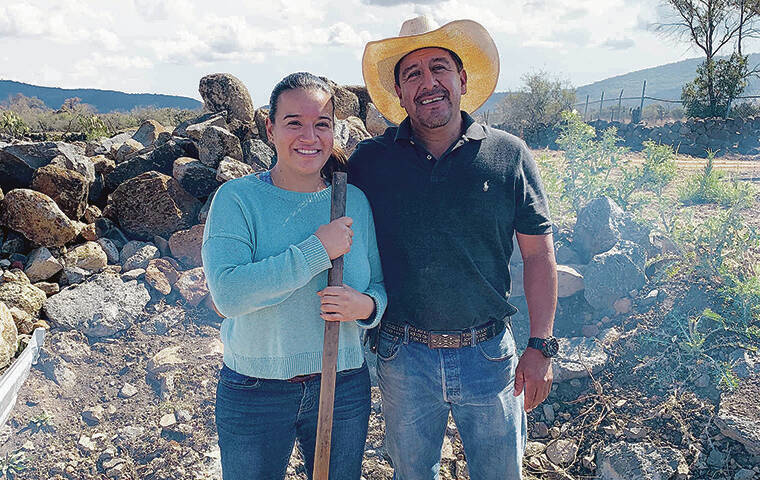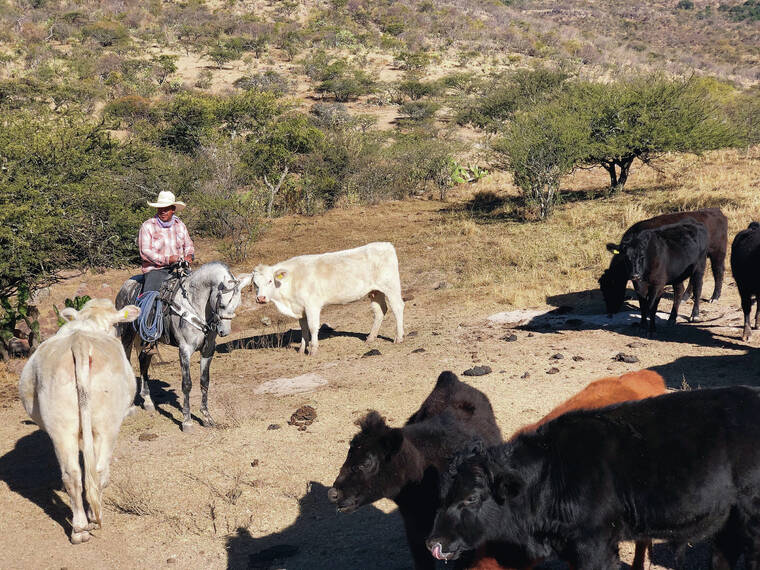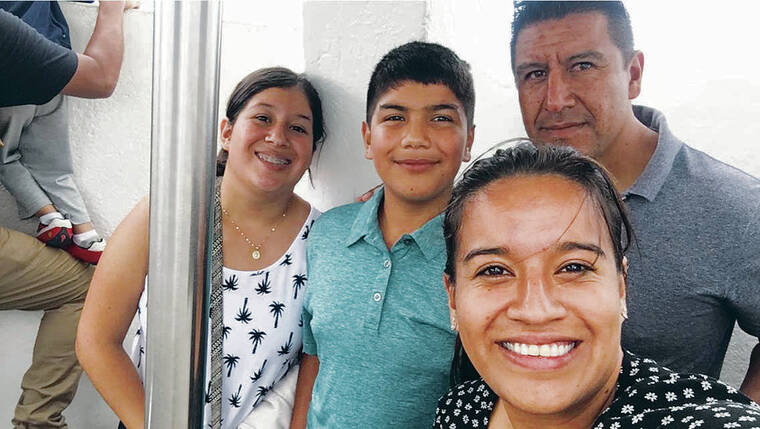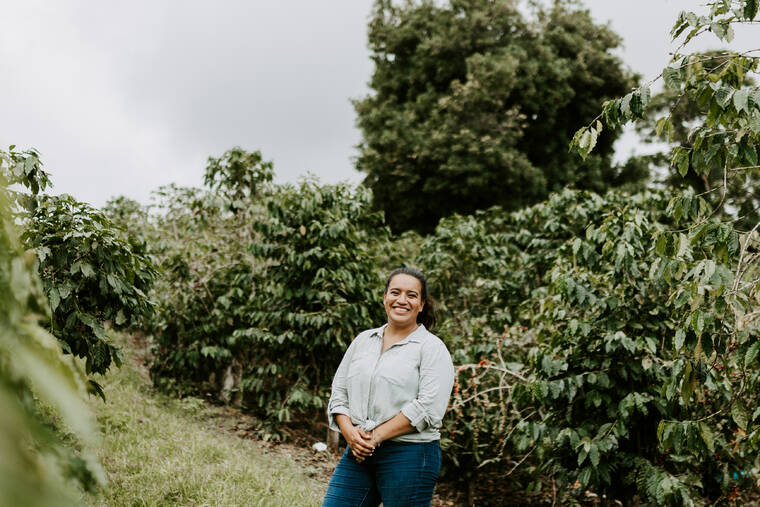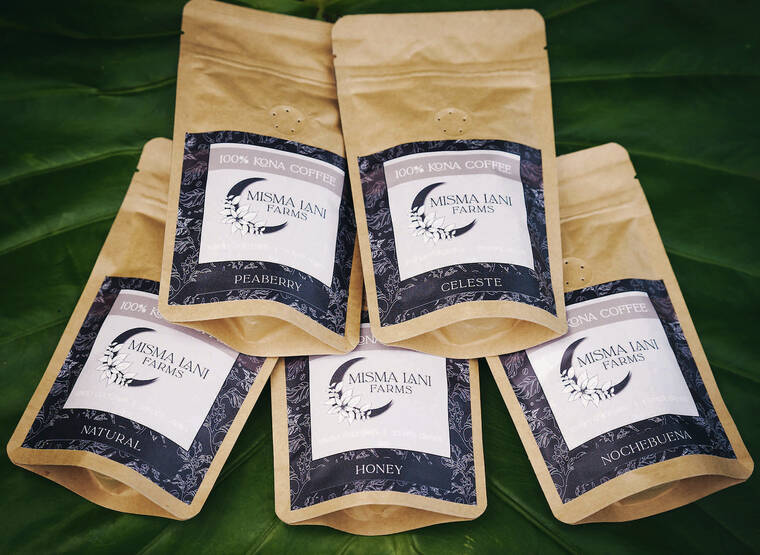Whenever Victoria Magana Ledesma misses her dad, she looks up at the sky.
One of her favorite movies as a kid chronicled the life of a boy who crossed the border in search of his mom in the United States. She told him that whenever he started to miss her, to look at the sky and moon because it’s the same sky she’s looking at too.
“I miss him. Your parents are your safety net, and I can’t see him too often,” Magana Ledesma said. “It kind of comforted me to know that I was looking up at the same thing as he was. We’re all under the same sky.”
It’s been nearly five years since Magana Ledesma’s dad, Kona coffee farmer Andres Magana Ortiz, had to leave Hawaii ahead of an immigration deportation order. After he said his final goodbyes in July 2017 to return to Mexico, Magana Ledesma, his oldest daughter who was 20 at the time, tried her best to take over the farm while also going to college part time.
Although Magana Ledesma, now 25, said it’s been difficult following in her dad’s footsteps, the farm is now thriving and venturing into new projects thanks to the support of family, friends, longtime employees and the Kona community.
Fittingly, she named the family business Misma Lani Farms, combining the Spanish word for “same” and the Hawaiian word for “sky.”
“The people who have built this foundation, including my dad, me and the crew, have all struggled. (But) it’s beautiful for us to be able to come out to the market and show our faces,” she said. “It’s a tribute to immigrant families and all families that are just separated.”
At 15, Magana Ortiz came to the United States from Mexico in 1989 without documentation and made his way to Hawaii to work as a coffee picker. Over the next several decades, he rose to become one of the most respected farmers in Kona, leasing about 20 acres and helping operate 15 other small farms. He also led efforts to help control the coffee berry borer, a pest discovered on Hawaii island in 2010, and worked closely with the U.S. Department of Agriculture on field tests.
When he received notice of deportation proceedings beginning in 2011, many community members and lawmakers protested the action, even writing a letter to the Department of Homeland Security and sending in signed affidavits urging that his removal be halted.
Suzanne Shriner, president of the Kona Coffee Farmers Association, described the deportation as “very disturbing,” adding that Magana Ortiz was a huge part of the Kona coffee community. But she said it’s been inspiring to see his daughter take over and expand the family business.
Shriner said she still keeps in touch with Magana Ledesma and added that her father “is probably really proud of her.”
“It’s a really fantastic backside to what was a really horrible story just a few years ago. I’m happy to see the growth that she has made in that business,” Shriner said. “The last 200 years of Hawaii (agriculture) has really been an immigrant story. Andres, in a lot of ways, embodied the American dream. He came here and worked hard. And he was successful because he worked hard.”
Although he was granted a temporary reprieve from the deportation order, Magana Ortiz was eventually ordered to leave and departed for Mexico on July 7, 2017.
Magana Ledesma said many of her dad’s longtime employees stepped up and took on more of a leadership role while she commuted every week between Kona to help manage the farm and the University of Hawaii at Hilo to attend classes.
She said she didn’t know at the time what she was getting herself into but was determined to keep her father’s legacy alive. A year later, in 2018, she graduated with degrees in sociology and business administration.
Magana Ledesma said that over time, she and the crew have shifted their roles. While the crew manages some of the farm’s operations, she focuses more on the mill. As the oldest daughter, she was used to having more responsibilities growing up but taking over for her father still didn’t come easy.
“I think I was just kind of surviving for a long time and just doing everything that I could. For the first year, I didn’t even believe it. And then we just kept going,” Magana Ledesma said. “My parents didn’t know English, so I had to deal with a lot of things from a young age. I think it was in me to take on that huge responsibility. But a lot of it was not really knowing that I was doing so much.”
In November, Misma Lani Farms launched a website and online store, and ventured into selling coffee under its own brand, which Magana Ledesma said was her dad’s dream.
Magana Ortiz now runs a small cattle business in Mexico, according to his daughter. Although it took him some time to adapt to a new life, she said he’s been able to reconnect with family in Mexico. His children also visit him regularly, and Magana Ledesma’s two younger siblings, one who is attending UH-Hilo and the other who will be moving to California to attend college soon, even stayed with him for eight months.
She said her dad also got his visa application recently approved but that there are still more steps needed to try to get him back to Hawaii. She added that she’d like to thank the Kona community for the strong support over the years. Even five years later, she still gets stopped at the grocery store, the bank and around town by people asking how her dad is doing.
“My dad’s really strong. He adapts everywhere and tends to just run full speed ahead. We try to see the good in things,” she said. “For so long, it was really hard to talk about this story. But a big thing was the people around me. The Kona community really remembers. You still feel the love.”
———
Jayna Omaye covers ethnic and cultural affairs and is a corps member of Report for America, a national service organization that places journalists in local newsrooms to report on undercovered issues and communities.
